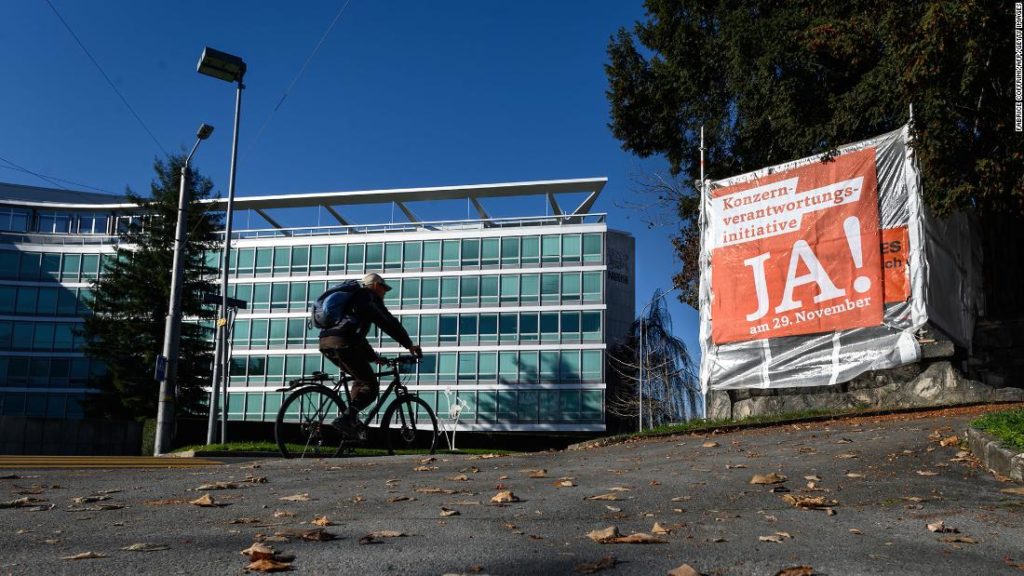Supporters of the Responsible Business Initiative have hung banners and signs from balconies and fences across the country. Swiss banks and other powerful businesses, meanwhile, have taken out expensive newspaper ads warning of dire consequences for the economy. The Swiss government also opposes the measure and is backing a watered-down alternative.
Even so, polls indicate that the “vote yes” camp could emerge victorious. A poll by Swiss broadcaster SRF in early November found 46% plan to vote in favor, while another 11% are leaning in that direction.
“I think it’s going to be very close,” said Guillaume Zumofen, a political science researcher at the University of Bern.
Battle lines drawn
Supporters of the initiative say that the referendum — which would amend the Swiss constitution if it passes — is essential given the global footprint of top companies in Switzerland, a hub for consumer goods, finance and commodities trading. They also point to the lack of remedies available to victims of wrongdoing.
The initiative would mandate that Swiss firms assess the human rights and environmental practices not just of their own operations, but also of subsidiaries, suppliers and business partners, ensuring they’re in line with international standards. Companies could then be held liable in Swiss courts for violations committed by subsidiaries and suppliers they control unless management proves proper due diligence was carried out.
“We need these clear rules and we need [a] clear accountability mechanism for damage,” said Danièle Gosteli Hauser, Amnesty International’s head of economic relations and human rights in Switzerland.
Businesses say the initiative could open the door to a flood of court cases. They fear the proposed rules could be applied very broadly, leaving them exposed to legal action even if the wrongdoing was committed by small suppliers.
The Swiss government agrees, and has instead backed a counterproposal, which would automatically go into effect if the initiative doesn’t pass on Sunday. The countermeasure would compel companies to increase reporting on environmental and social issues, with a particular focus on child labor and conflict minerals.
Companies like Nestlé and Glencore also back this approach. Erich Herzog, head of competition and regulatory affairs at business lobby Economiesuisse, said it would allow companies to remain engaged in certain countries and lobby for improved conditions on the ground, instead of having to withdraw entirely. Those pushing the Responsible Business Initiative, however, say it would do little to compel actual change.
A broader trend
However the referendum goes, Swiss companies will face new rules, though a “yes” vote would take longer to implement, according to Mark Veser, head of climate change and sustainability services at EY Switzerland.
“In either case, there will be new requirements,” he said. Currently, unlike firms in the European Union, Swiss companies are not required to disclose nonfinancial information, he added.
“Accepting this initiative would prompt Swiss companies to move to other countries, leading to the loss of valuable jobs and taxable assets in Switzerland,” they said.
Finding a new home with less onerous requirements may not be easy. Across Europe, the direction of travel is clear, according to Rachel Barrett, environmental and climate change partner at global law firm Linklaters.
France has also enacted a broad law that holds companies responsible for abuses throughout their supply chains, though the Swiss government claims that the Responsible Business Initiative would impose even tougher liability on companies.
The European Commission is expected to propose new rules for due diligence on human rights and the environment throughout supply chains in 2021. There’s talk they could be the most demanding to date.
“The calls for this are growing louder and louder, and there’s a lot of momentum behind it,” Barrett said.
— Mark Thompson contributed reporting.
You may also like
-
Afghanistan: Civilian casualties hit record high amid US withdrawal, UN says
-
How Taiwan is trying to defend against a cyber ‘World War III’
-
Pandemic travel news this week: Quarantine escapes and airplane disguises
-
Why would anyone trust Brexit Britain again?
-
Black fungus: A second crisis is killing survivors of India’s worst Covid wave

